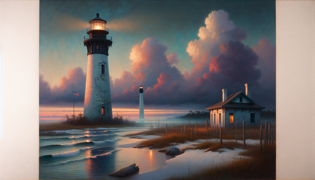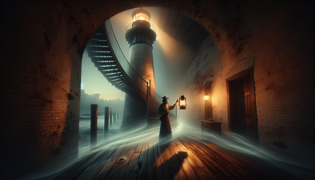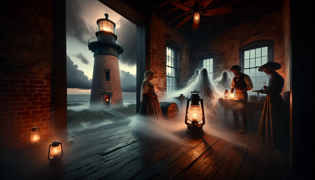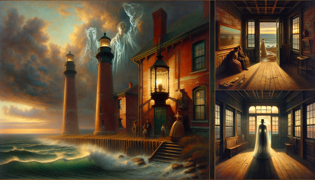The Lighthouse Spirit of Pensacola
Reading Time: 9 min

About Story: The Lighthouse Spirit of Pensacola is a Legend from united-states set in the 19th Century. This Dramatic tale explores themes of Loss and is suitable for Adults. It offers Entertaining insights. A ghostly keeper’s vigil endures in the salt-scented air of Pensacola Light.
Introduction
The Pensacola Lighthouse rose like a solemn watchman against the Gulf’s restless sighs. Its white brick stood weathered, its lantern long since the keeper’s hand, yet still it held a certain stubborn pride. Each sunset, the beacon’s glow drifted across calm waters like a pale promise. Locals would say, “Bless your heart, you’d swear that tower breathes.”
On most evenings, a salt-tinged breeze drifted through the iron door at the base. Seaweed and brine clung to boots and skirts, while distant gulls cried like distant choirs. The air smelled sharp of kelp and rain-warmed timber. I declare, there was magic in that tang—the lighthouse spirit’s fragrance.
Long after midnight, footfalls echoed across the spiral stair. Not all who climbed were living. Spectral forms of former keepers lingered, ever dutiful, ever watchful. Their lanterns glowed without flame, like ghostly will‑o’‑the‑wisps dancing against the stone. A hush fell whenever they passed, as if the very walls held their breath.
No visitor could ignore the hush. Some claimed hearing a lament drifting through the lantern room, soft as a lullaby turned sorrowful. Others fled at the sudden chill, their lanterns sputtering. Local folk called it “the Endless Watch,” a vigil older than memory. And so I found myself drawn here, unsettled by tales of devotion beyond the grave and determined to learn the truth.
Shadows at Dusk
When the sun dipped behind cotton‑candy clouds, the world beyond the tower grew dim. A hush blanketed the shoreline, broken only by the hush of brine‑spun wind and faint clang of rigging from anchored vessels. Labyrinthine shadows stretched along the tower’s spiral stair, pooling against the bricks like dark ink. It was then that the first murmurs rose from the gloom—a low keening that wound around the bannisters, chilling marrow.
I climbed slowly, palm grazing the iron railing, its cold texture reminiscent of damp skull. Each step felt weighted by memory. Halfway up, the scent of old lamp oil crept through the air, mingling with salt and mildew. I caught my breath, the tang clinging to my tongue. The hush deepened, as though the stone itself listened.
A lantern’s glow flickered ahead, yet no keeper stood by. Instead, a faint figure hovered near the mahogany door to the watch room. He wore a battered coat, hair silvered by storms past, and eyes bright with purpose. His shape wavered like heat mist on sun-baked sand. The light he held seemed alive, a miniature sun caught in glass and brass.
“Who goes there?” I asked, voice low. The figure paused, then turned. His lips parted in a silent whisper. In the stillness, I heard a name—Carrowby, the first keeper whose sacrifice had ensured the tower’s safety through a savage gale ninety years before. Legend called him the lost helmsman, yet here he stood, bound to duty beyond death.
The air grew colder still. I pressed closer, drawn by equal measures of dread and awe. In that moment, I realised the tower’s true sentinel was no mere ghost but a soul determined to guide mariners home, come wind or water. With that revelation, the lantern blinked thrice, then winked out, leaving only pulsing shadow and promise.

Whispers of the Forgotten
By candlelight in the keeper’s quarters, I poured over yellowed logs. Each entry detailed near‑disasters thwarted by timely flashes from the lantern room. The penmanship trembled on certain pages, as if the writer’s hand felt unseen eyes. Beside me, a glass jar held driftwood fragments, each piece inscribed with a name—the mariners saved from storm‑wreck by the tower’s beam.
A sudden gust rattled the sash, carrying a low mumble from beyond the door. The wood beneath my fingertips vibrated, as though humming a centuries‑old lament. I lifted my candle and stepped into the corridor. The walls bore carved initials, scrimshaw left by keepers gone to dust. Their marks looked fresh in the dim glow, each letter etched deeper than memory alone could explain.
The mumble grew into distinct words: “Steady…steady…hold fast.” It pulsed through the plaster, a heartbeat echoing in stone. Gently, I placed my hand on the wall, feeling the rough surface like parched earth. The voices of those lost seemed to breathe, swirling around me in a hush of dust motes dancing in the candle’s halo.
A second sensory bloom filled the air then: the faint tang of hot metal, like the forge of a smith yonder, mixed with the faint perfume of night‑blooming jasmine drifting through a cracked window. It was incongruous yet oddly comforting, as if the tower wafted memories from distant gardens and forges alike.
I spoke softly, proposing a pact: I would honour their vigil if they guided me through the coming storm. Silence answered, then a single drop of water plinked onto the wooden floor. No more. The hush returned, pregnant with unspoken promise. In that stillness, I understood: these whispers were not random hauntings but earnest instructions, a map to preserve the light in darkness.

The Keeper’s Vigil
Storm clouds gathered over the Gulf like a ravenous horde, roiling to the west. Lantern flames inside the tower quivered, threatened by gusts that rattled glass panes. I ascended the stairs again, each step creaking under my weight, awash in salt-scented wind creeping through fractured mortar. The hush from before returned, deeper now, as though the tower itself braced against the gale.
At the watch room doorway, I found two figures: Carrowby and a younger keeper in a scarlet waistcoat, his face lined with fear yet alight with resolve. They stood shoulder to shoulder, arms outstretched as though to steady the lantern. The younger one’s eyes met mine and he whispered, “Hold the glass firm, miss, or we’re blind to the seas.”
Reaching out, I grasped the brass handle of the lamp cage. The metal was scorching hot, like a live coal, and the glass begged for careful fingers. I wrapped a scrap of cloth ’round my palm and steadied the light. Behind me, the walls sung with the wind’s howl—a chorus of roaring waves and snapping timber.
Fractured beams of lightning cut through the murk, illuminating the swirling mist that pooled at our feet. Each flash revealed the ghosts of former keepers, their translucent forms aiding with steadying rods and sweeping debris. Their whispers melded into a chant: “Shine on. Shine on.” It rose like distant thunder.
I thought of every life saved by that beam, the grateful reunions and prayers offered on distant decks. “By thunder,” I muttered, “we won’t fail you now.” With one final heave, the lantern blazed to full brilliance. Its radiance tore through the storm like a sword of light, slicing open the darkness so that no ship might founder on the hidden shoals. In that moment, I felt the warmth of countless hands guiding mine and knew the vigil would endure.

The Endless Watch
When dawn’s pale fingers brushed the horizon, the storm retreated like a wounded beast. Broken clouds drifted eastward, and the sea lay calm once more, gleaming like molten glass. I descended the tower, the hush now friendly, almost triumphant. Each echo of my footfall felt like applause from those long gone.
In the courtyard, keeper’s boots caked with salt and mud. Carrowby stood silent beneath the lamp’s metal frame, his form less wraith and more presence. The younger keeper offered me a mug of coffee—thick and black as midnight oil. Steam curled upward, carrying the bitter aroma of roasted beans.
I sipped, relishing the warmth it lent my chill. Nearby, gulls wheeled against pale sky, their cries bright as church bells. The tower’s tall shadow had shrunk from imposing sentinel to humble guide. It still lived, still protected, still watched.
“Y’all did it,” the keeper said, voice rough as gravel. “You joined the watch.” His accent curled like Spanish moss. I smiled, thinking of all I’d learned through whispered admonitions and ghostly guidance.
“What shall I call you?” I asked the phantom. He tilted his head, lantern droplets flickering as if he considered. Then he spoke in a voice like wind through reeds: “Harper.” A name carried by time.
Sunlight warmed the brick walls. The world resumed its steady rhythm of gull cries, rolling surf and distant church bells. Yet I sensed new harmony threading through each sound—the living and the departed united in purpose. The Endless Watch would endure as long as someone heeded its call. And I would forever cherish the fragile kinship between soul and stone under Pensacola’s wide sky.

Conclusion
Even now, travellers passing by the Pensacola Lighthouse speak of its unwavering beam cutting through fog and dusk. They swear they glimpse a hooded figure at the balcony, gazing seaward with lantern in hand. Locals nod knowingly and offer a quiet prayer: may the keepers—both flesh and spirit—never tire.
I remain the latest in a lineage of watchers, drawn by tales of devotion older than any living heart. Each night, I climb the spiral stair, feeling the reassuring thrum of unseen footsteps at my heels. The lantern’s glow warms my palm as though transfused by every soul who ever held it before. Its light is more than flame; it is remembrance.
Storms will come and go. Ships will mark the coastline by that steady pulse of brilliance. Yet the true miracle lies hidden in the hush and the hush carries their murmured vow: the Endless Watch endures.
So long as salt and wind caress these walls, the spirit of Pensacola Lighthouse shall stand unwavering, a guardian forged of stone and memory. And when the lantern flame dips low, someone—living or departed—will steady the glass and whisper, “Shine on, shine on.”

















